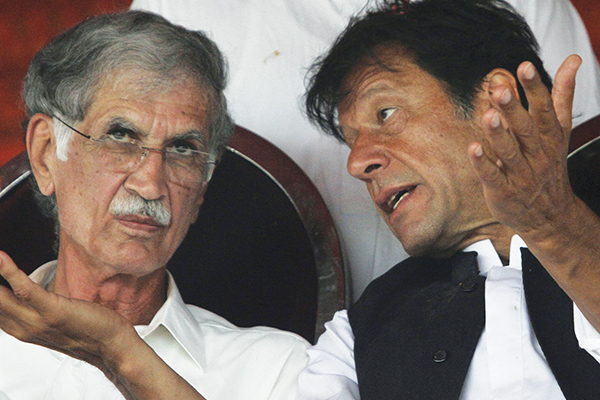
Abid Nawaz
We recently spoke with the newly-elected chief minister of Khyber-Pakhtunkhwa province about governance, the militancy, and drones. Excerpts:
What’s the top priority for your Pakistan Tehreek-e-Insaf-led provincial government?
Khyber-Pakhtunkhwa is an extremely difficult province to govern. Maintenance of law and order is a need, not just a priority. And that is precisely why peace is on top of our agenda, followed by measures to curb corruption. Listen, we are at war… well, almost. We need to save our province from the hell it is currently in. But even our powers are restricted. The tribal areas are not part of our domain and we cannot interfere in their workings. They are in fact [controlled by] the federal government, which makes the policies [for them]. My suggestion to the new [federal] government is: take all stakeholders onboard—the political parties, clerics, the Army, and the people living in the tribal belt—to frame a holistic and clear-cut policy. You cannot just increase police powers in Khyber-Pakhtunkhwa and expect stability. The police can do nothing here.
What progress has been made to initiate peace talks with the Pakistani Taliban?
PTI is very clear on its stance. Our party is determined to forge a peace agreement with the militants as we cannot be engaged in battle forever. The people are suffering, and so is the Army. This is where Islamabad should step in to initiate talks. Also, foreign interference needs to stop. Drone strikes should be halted immediately. [The U.S. is] overstepping and violating the rights of the Pakistani people. We can solve our own problems. We do not need their help.
The militants are opposed to the Constitution and previous peace agreements with them have failed. How realistic are the chances for fresh talks?
Anything is possible. If there is a will there is a way.
The Tehreek-e-Taliban Pakistan is a fractured group and there are other militants operating out of the federally-administered tribal areas. Who would your government hold potential peace talks with?
I don’t know who these other groups are. Who are these other militants? I’m not very clear on that. I don’t know who is doing what and where. Really, no one knows what is going on.
Your party said it would shoot down drones if it won power. Is the option of shooting down U.S. drones a viable one?
It is not a matter of whether we can shoot a drone or not. It is a matter of Pakistan’s sovereignty. You cannot just attack us sitting outside our borders. But let me also reiterate: I do not have the powers to make these decisions. Now, if [PTI chairman] Imran Khan was [prime minister] we could have seriously thought about how to deal with the drone assaults [in FATA].
How closely do you expect Khan to be involved in matters of the provincial government?
Imran Khan is my leader and the chief of my party. Once we receive his instructions, we get together and discuss them for the betterment of our people. What led to the previous government’s downfall in Khyber-Pakhtunkhwa was mismanagement and corruption. In fact, there was no real government in place. Everything was up for sale. Looting was a norm. That is all going to change now.
Can the foreign fighters holed up in the Waziristan agencies be flushed out?
The tribal areas are not our domain. But we are conscious of those in Khyber-Pakhtunkhwa. We will be increasing our vigilance and intelligence to stop them from causing havoc.
From our June 14, 2013, issue.
